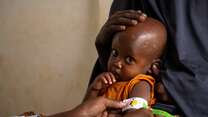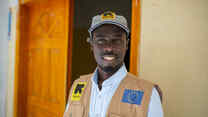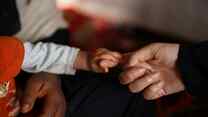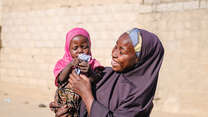A feasibility study of low-literate community health workers treating severe acute malnutrition using simplified tools and protocol in Northern Bahr el Ghazal State, South Sudan
Malnutrition underlies nearly half of all deaths among children under the age of five. Despite this burden, 90% of malnourished children still cannot reach the life-saving treatment they need. We believe that the treatment can be brought directly to them.
Objective
To assess the feasibility of community health workers (CHW) in South Sudan providing treatment for uncomplicated cases of severe acute malnutrition (SAM) in their home communities.
Background
Estimated 270,000 children in South Sudan are currently suffering from SAM. Coverage surveys in Northern Bahr el Ghazal State found that roughly 60% of severely malnourished children were not enrolled in treatment programs. Long distance, rough terrain, and high opportunity costs deter caregivers from accessing essential treatment from outpatient clinics, which is the current standard of acute malnutrition treatment.
The International Rescue Committee (IRC) operates integrated Community Case Management (iCCM) programs in Northern Bahr el Ghazal that equips low-literate CHWs with the ability to treat common childhood diseases of pneumonia, diarrhea, and malaria. The IRC is conducting a feasibility study to determine whether treatment for uncomplicated SAM can be integrated into the iCCM protocol, with the use of job aids and tools that have been adapted for use by low- literate CHWs.
Methods
The study is being conducted in two parts. First, innovative tools for low-literate CHWs were developed using a human-centered design process. CHWs and nutrition staff in Mali, Chad, and South Sudan partook in a total of five field tests where they used and gave feedback on prototypes of tools. This iterative process produced a patient register, mid-upper arm circumference (MUAC) tape, weight scale, and dosage calculator tailored to low-literate users.
In the second stage (Spring / Summer 2017), the IRC trained a cadre of 57 CHWs in South Sudan to treat SAM using these tools, assessed their ability to follow the treatment protocol, and deployed high-performing CHWs to treat SAM cases in their home communities. The CHW performance scores, treatment outcomes of the children enrolled in the study, and qualitative data on program success and challenges will be available in Fall / Winter 2017.
Potential impact
The current outpatient treatment model for SAM can be logistically taxing on families, which threatens access to and continuity of care. The findings from this study could help alleviate the burden of acute malnutrition around the globe. The study also seeks to contribute to a wider evidence base on how to improve coverage in areas with poor access to health services.
Author: Naoko Kozuki



